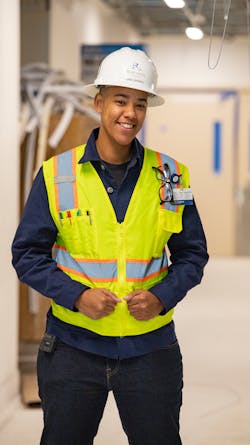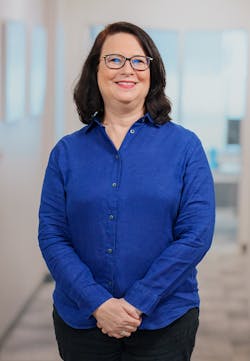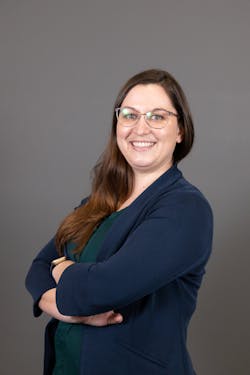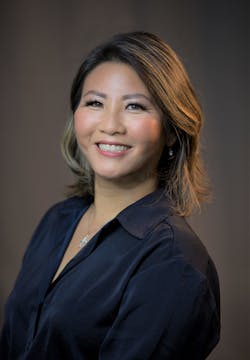With each passing year, more women are finding their way into the construction industry in general and the electrical contracting sector in particular. And every year, the National Association for Women in Construction (NAWIC) marks that progress by designating a week in March as Women in Construction Week; this year it is March 5-11.
Over the years, select firms in the industry have distinguished themselves by being leading voices in the push to have more women pursue construction careers. One in the electrical contracting world is Rosendin Electric. The San Jose, Calif.-based firm has worked closely with NAWIC, including the 2021 sponsorship of a construction camp for girls – Camp NAWIC. And the company’s ranks at all levels have become steadily filled with more women, reflective of its desire to be at the forefront of efforts to diversify the construction workforce.
Marking Women in Construction Week and recognizing Rosendin’s efforts, EC&M profiles four women who have built careers in the industry and at Rosendin, overcoming varied challenges and obstacles along the way and presenting themselves as evidence of the progress women are making in the industry.
Undeterred, project manager worked her way up
Jammie Barnes didn’t think twice about knocking on the door of the IBEW 952 union hall almost a decade ago. A licensed EMT and a certified Fire Fighter 1 in California, she thought she had the transferrable skills to make it in the construction world — and she turned out to be right.
Today, after working as an electrician and moving into an assistant project manager role in 2018, she is a project manager at Rosendin, routinely assigned to many extended hospital projects the company has been tackling.
As her career has progressed, Barnes hasn’t let stereotypes about construction or electrical workers stand in her way. She simply knew that, like any other worker, she had to prove herself. But in the back of her mind, she understood the bar was perhaps higher.
“Working in the field I certainly had to be a bit stronger, had to do more to erase any shadow of a doubt that I couldn’t hang,” she says. “That was the case in the past, but currently I don’t feel I have to work any harder or that I’m being compared to men in my field, which is awesome.”
Barnes’ path through that world has been aided some by the presence of other women. Her first boss as an apprentice was a female general foreman, and she’s seen the numbers of female co-workers and role models grow over time.
“The lines are blurring more and more (between men and women in the field), and the shock factor of a woman on the job site is dwindling away,” she says.
Now, her identity is tied solely to the quality of her work. Having developed and been recognized for extensive knowledge of hospital projects, Barnes is focused on working through the daily battles that are both challenging and invigorating.
“I try not to let anything about who I am be a challenge or a disadvantage,” she says. “As a woman in this industry, when I go to work each day everyone is on the same playing field, regardless of gender.”
Looking ahead, Barnes sees expanding opportunity, not only for herself at Rosendin, but also for other women at the company and in the broader industry. Interacting more with upper management, she’s getting a glimpse of the possible next career steps. And while she’s plotting her own growth while working hard and enjoying the journey, she’s deepening her involvement in NAWIC, networking with other women and hopefully serving as a role model for others.
“The greatest perk to being a woman in construction is paving the way for younger girls and letting them see that the construction industry is something they can shoot for as well,” she says.
Sliding into a new role, project manager makes a move pay off
“Women get things done,” says Kara Bunn, matter-of-factly.
A project manager in Rosendin’s Hawaii office, her track record offers proof. Formerly a co-owner of an electrical construction company in Texas with her husband, mostly handling the books, Bunn moved to Hawaii after the business was sold. Ready for a new challenge, she landed a job there with Rosendin as an administrative assistant. Soon, she was handling assistant project manager duties that eventually led to her current position.
Working alongside several other women in the office and motivated by the day-to-day challenges, Bunn hasn’t been deterred by the challenges of what amounts to a new career. Nor has she labored under any sense that a woman might not fit into what might be considered a man’s world – that, in fact, has “encouraged me to persevere,” she says.
“The only person standing in the way of any upward mobility is me, and I intend to not let myself get in the way,” she quips. “The contours of my path are not as defined as they would be in a first career, so I’m not going to be afraid if the path takes a slight detour along the way. I’ve met some wonderful people in this new career and learned some new things.”
Currently managing a 17-story senior affordable housing project due for completion soon, Bunn sees herself working at least a couple more years in her current role. Construction, she says, offers a “challenging but rewarding career path,” one she hopes other women so inclined will follow. She takes full advantage of NAWIC networking, educational and mentoring opportunities and sees more clearly than ever the need for industry to hire more women and for females to seize opportunities.
“The industry would benefit from having more women involved,” she says. “I am encountering more women regularly than ever before.”
Climbing the ladder, trainer has found her passion
A regional trainer with Rosendin, Dani Stauft has 14 years of experience in the construction industry’s electrical sector, beginning with an electrical contractor apprenticeship while pursuing an engineering degree. Before taking the training role in 2021, Stauft held estimating, project engineer, project management, and business development roles with Rosendin and other firms.
Starting out, Stauft sensed that she would face obstacles as a young female newcomer to male-dominated industry. She overcame them by tapping a well-developed “can-do” approach to challenges, committing herself to working extra hard and becoming a subject matter expert.
“If I had to put a word to what it has been like to be a woman in construction I’d say ‘underestimated’ is it,” she says. “That can seem like a disadvantage until you blow everyone’s mind and impress the owner so much that they are still calling you years later for your expertise.”
Stauft’s spine was stiffened by her first boss as an intern, another woman. Smart and dedicated, she was a mentor, she said, encouraging her to be inquisitive and bold. Years later, her first boss at Rosendin was another woman who modeled the importance of work-life balance, an issue for many working women.
That understanding came in handy when, during the pandemic, Stauft was tapped to manage a groundbreaking, $17-million bio-pharmaceutical project she helped land for Rosendin, a career highlight. With many employees working remotely, she had to strike a balance between project timeline demands and workers’ disrupted lives.
“I had to figure out how to make sure the work got done each day while also respecting the fact that people who reported to me were also parents who now had to take care of their kids while juggling work from home,” she says.
That eye-opening experience, in turn, led her to shift her career focus to training. With the project complete, she took the training position with Rosendin, focusing on supporting employees on the project management track — a top company priority.
“I discovered I loved helping people learn how to do their job more efficiently or in a way that is manageable for their workload,” she says.
Throughout her career, Stauft has complemented her work with side efforts to help women and young people discover opportunities and thrive in the field. She serves on a Rosendin employee resource group for women and has served as an ACE mentor for youths interested in architectural/construction/engineering careers. Having tasted career success, she is committed to helping open doors in her company and the industry to the full range of qualified candidates.
“I still feel like I’m working toward an ultimate goal of making the industry more accepting of and accessible to women and other minorities,” she says. “Every time a new woman is hired in my office, I get excited to see the scales tip a little more.”
Greener grass beckoned, and a project manager kept it in view
As the longtime office manager in Rosendin’s Hawaii office, Jodi Watanabe long wondered: What’s on the other side, and how, as a woman, can I get to it? Specifically, the operations side of the business.
Seeing other women in various “non-typical women’s” roles at Rosendin, she bided her time, waiting for her chance. She had the genes – her father was an electrician; her grandfather a welder. And she had the motivation: An ex-fiancee who worked in electrical distribution warned the rough-and-tumble construction industry would eat her alive. And the interest was clear. Slowly, she got to spread her wings and nourish her ambition, taking on project assistant tasks two days a week that exposed her to other women on the general contractor’s project team.
And then, at last, opportunity knocked.
“After seven years as an office manager, and the only woman in the Hawaii division, an assistant project manager spot finally opened last year and I was given the chance to finally get in front of the action in operations,” she says.
Now, Watanabe is using talents she honed at previous jobs in the HVAC industry – primarily team building – that got her close, but never quite to the promised land of operations. In her key support role, she continues to shoulder new responsibilities such as submittals, document control and procurement and is thriving as the challenges mount.
“I feel that I have been thrown into daunting projects, but that I am proving myself every step of the way,” she says.
One key to her recent advancement, says the holder of an undergraduate psychology degree, is a good grasp of “soft skills,” something women might have in greater abundance than men. The ability to listen, bring people together, and build bridges are “skills that might not come as naturally to a lot of men,” she says. But they’re increasingly important in an era of changing workplace mores.
“Soft skills that women can more easily incorporate can be a big asset when working with others and bridging the gap between old-school and new-school ways to build a good team environment and higher employee retention,” she says.
Watanabe isn’t sure exactly how her career will unfold but expresses confidence that Rosendin offers solid growth opportunities. Surrounded by a growing number of women in various roles at a firm that is out front on minority hiring, she senses a strong support network. And while her own career blossoms she is also making time to help other women break into the field. An NAWIC Hawaii chapter board member and committee chair, she wants to make the path smoother for other women.
“It’s time and dedication serving on NAWIC, but I love knowing we are making a difference in the community for girls and women,” she says. “Now that I’m in the industry I want to let other women know that they, too, can be a part of it.”
Tom Zind is an independent analyst and freelance writer based in Lees Summit, Mo. He can be reached at [email protected].
About the Author
Tom Zind
Freelance Writer
Zind is a freelance writer based in Lee’s Summit, Mo. He can be reached at [email protected].




